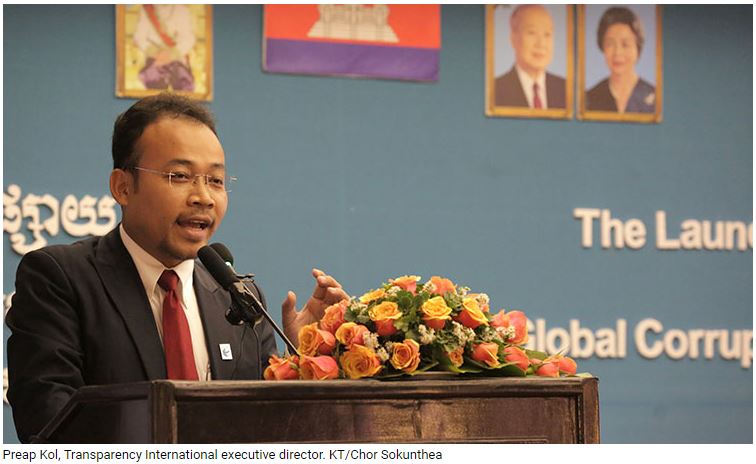Cambodia: ‘We need to fix Sihanoukville’ Q&A with Transparency International
The massive investment coming from China into Sihanoukville has positive and negative effects on the province. In order to understand the pros and cons, Transparency International executive director Preap Kol sat with Khmer Times Business Insight to dissect the situation in the province.
KT: What is your opinion on the different issues regarding the development of Sihanoukville?
Mr Kol: Related to the influx of Chinese investment, I see both positive and negative points. These negative points can be fixed if we pay more attention. On the positive side, we saw a rapid change in Sihanouvkville’s landscape with high-rise buildings – construction of new hotels, restaurants, casinos, and entertainment clubs, and so on. We thought it was like China’s Shanghai when it first started.
With the changes in the province, we also started seeing some controversies linked to some Chinese citizens living in the province. There is disobedience by troublemakers. They use guns, drive cars fitted with fake Royal Cambodian Armed Force (RCAF) number plates, and are involved in illicit businesses. All this creates some difficulties for the locals when they visit or stay in the province. In the past, it was easy to find accommodation without any booking, but this is not the case anymore. Sihanoukville has lost its Khmer image. This is another change.
What I am really worried about is the perceived double standards. Locals are supposedly treated differently than foreigners, who are simply requested to obey the law. On the other hand, Khmer people who are suspected of having committed a crime are immediately handcuffed, hit and kicked. This is a weakness and is probably influenced by the money of Chinese businesspeople and investors.
KT: You just mentioned the high-rise buildings and new businesses in Sihanoukville. Do you think this contributes to the well-being of the locals?
Mr Kol: Cambodia has a policy that allows foreigners from all over the world to invest and we need the investors to create jobs and help in our economic growth. But I want to see the right management of foreign investments. Because if we look at the growth of Sihanoukville, we have to ask whether the people in the province benefited from the investments. And I think that this is the case. Service providers, for instance, earn money from Chinese tourists and from those who do business in the province. But there is a need to get the businesses to pay tax as this is income for the government.
However, many people have also been constrained due to intense competition from the Chinese who has more capital to invest. For example, the small canteens are taken over by Chinese operators, putting pressure on the locals. We need to look into how the locals can benefit more and how to limit their losses or build another source of income for them.
KT: What attracts Chinese investors to the province?
Mr Kol: Sihanoukville is an attractive tourism destination with beautiful beaches. It is a great place for business and trade. With more tourists coming to the province, it motivates investors to build more attractive places like hotels, restaurants, and gaming centres.
Sihanoukville has a deep-sea port near the Chinese sea, which plays an important part in geo-politics. China has a long-term strategy and Cambodia is of strategic importance to China within the Asean region. China needs Cambodia’s support in the South China Sea dispute and does not want to see Vietnam have much influence over Cambodia. Vietnam already has influence over Laos.
China has a huge population and it has set out a plan to send its people out to live in other countries, not only in Cambodia. That is because they have a population crisis and they need to be sent somewhere. So we have to strengthen the laws related to this type of immigration.
KT: Cambodia is part of China’s Belt And Road Initiative (BRI) and pledged to attract 2 million Chinese tourists, and allow the yuan to be used as currency in some tourist sites. What’s your opinion on this?
Mr Kol: The BRI is Chinese President Xi Jinping’s brainchild. It does not only cross Cambodia, but many other countries as well. China also provides loans to build roads in BRI countries. So they are smart. But we have to be careful because there is the experience of Sri Lanka. China provided loans to build roads and a port, but the government did not have the ability to pay back, so Sri Lanka handed the port to China.
KT: Cambodia has a $4 billion loan agreement with China and you just mentioned Sri Lanka’s experience. What should Cambodia do to avoid a similar outcome?
Mr Kol: We are a developing country. We cannot avoid borrowing money to develop the country. China is the easiest country for Cambodia to get loans at negotiable rates. If our country can maintain the economic growth, it will not be a problem to pay back. However, there are risks. For example, there is a world economic crisis and it affects Cambodia. We might encounter a problem to pay back the debts. We also have to think about the Everything-but-arms treaty with the EU, as it is a big market that can continue to contribute to our economic growth.
Source: https://www.khmertimeskh.com/50549308/we-need-to-fix-sihanoukville-qa-with-transparency-international/


 Thailand
Thailand




